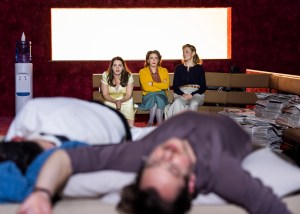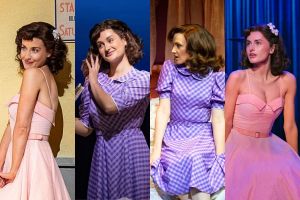The European premiere production of Andrew Upton’s Riflemind, directed by Oscar winning actor Philip Seymour Hoffman, opened at the Trafalgar Studios last night (19 September 2008, previews from 15 September) with Upton’s wife Cate Blanchettt amongst the celebrity guests (See Today’s 1st Night Photos).
Riflemind had its world premiere in Sydney in October 2007, directed by Hoffman. It tells the story of John, once the frontman for one of the world’s biggest bands, Riflemind. Now John and his wife Lynn are safe from the world in their walled country house. Money and anonymity, however, won’t protect them from themselves or their past. As a comeback tour nears, the band, associated spouses, lovers and hangers-on reunite for a rock’n’roll circus of a weekend.
Co-starring alongside Hannah are fellow Brit Paul Hilton (Rosmersholm, The Wild Duck, Mourning Becomes Electra on stage) and original Australian cast members Susan Prior (as John’s wife Lynn), Steve Rodgers and Jeremy Sims. The production is designed by Richard Roberts with lighting by Damien Cooper and original music by Max Lyandvert.
Overnight reviews were decidedly lukewarm, the primary complaint of critics being the failure of the play to live up to the promise of its rock ‘n roll premise. “Dreary dross” and “theatrical suicide” were among the most cutting descriptives, although the performances of the cast were roundly praised – the “excellent” John Hannah and “wonderful” Paul Hilton emerging with the strongest plaudits. Seymour Hoffman’s “elegant” direction largely escaped the critics’ wrath, whilst author Andrew Upton bore the brunt of the blame for his “predictable” and “narrowly-focused” script.
Michael Coveney on Whatsonstage.com (three stars) – “Andrew Upton – whose blistering version of Gorky’s Philistines was a National Theatre highlight last year – has talked the talk and walked the walk in his new play (first seen at the Wharf Theatre in Sydney last October) but the end result is a bit of a dog’s dinner. Who cares, frankly, about the soul-searching, dead-of-night meanderings of a quartet of deeply unappetising blokes who could pluck a few chords and batter themselves into oblivion on booze and drugs? … Even more unsavoury than the band is their manager Sam (Jeremy Sims) who is supposed to be cutting some deals but is also trying to re-ignite his sexual liaison with Phil’s girlfriend (Ruth Gemmell); this he does in some rapid, explicit cavorting over the back of the sofa. The play tails off badly with a suggestion that, after the rows and the heartache, the tour will go ahead after all and make things even worse for everyone.”
Charles Spencer in the Daily Telegraph – “Andrew Upton … has somehow managed to turn potential dramatic gold into dreary dross in a leaden and confusing drama that is poorly constructed, dismayingly unfunny, and without a single character you come to care about … Upton, who was recently responsible for a fine new version of Gorky’s Philistines at the National Theatre, writes here like a tin-eared novice. What few decent jokes there are seem mistimed, while the feeble plot delivers a series of revelations that have been artificially delayed to raise the dramatic stakes but still fail to deliver a decent punch … Philip Seymour Hoffman directs a restless production with lots of his trademark overlapping dialogue, while Max Lyandvert’s far from thrilling original music, which sounds like a poor imitation of Nirvana crossed with the Jesus and Mary Chain, makes one wonder why Riflemind ever became successful in the first place … As David Bowie almost said, this ain’t rock and roll, this is theatrical suicide.”
Michael Billington in the Guardian (three stars) – “Andrew Upton did a dazzling adaptation of Gorky’s Philistines for the National. But his new play Riflemind … is a far more mixed affair. Dealing with the mooted reunion of a once-iconic rock group, it may be of interest to aficionados but it never achieves the potency of theatrical metaphor … what we get is a narrowly-focused play about the hectic unreality of rock fame and the primacy of family values. In the end, it turns out to be as much a play about sibling love-hate and John’s protective attitude to his flaky wife as it does about rock’s place in the wider scheme of things. At least Philip Seymour Hoffman’s production gathers momentum in the second half, as John and Phil are revealed to be brothers. John Hannah also gets a chance to explore the source of the hero’s surliness, Paul Hilton acquires a measure of sympathy as the wasted Phil, and Susan Prior’s Lynn dutifully succumbs to the pressure of events.”
Benedict Nightingale in The Times (three stars) – “The trouble with reunion plays or films, whether they involve college graduates or anyone else, is that they tend to be predictable … And so it proves with Andrew Upton’s Riflemind, which brings John Hannah and the excellent Paul Hilton to the West End and several other performers from Sydney, where Philip Seymour Hoffman’s production originated … the first act seems a bit repetitive and, apart from the moment when the band’s manager has comically hasty sex with a musician’s wife, pretty eventless. There were times when I wished that Hannah would revert to being his TV character, Ian Rankin’s Rebus, and buzz off to Edinburgh to arrest the serial killers who gather regularly in Waverley Station … The cast is immaculate. You won’t see a half-stoned scene better played than by Hilton or many more credible exemplars of good-natured confusion than Steve Rodgers’s Moon, the group’s needy, near-bankrupt drummer. Yet the emotional stakes never seem as high as effective drama demands.”
Nicholas de Jongh in the Evening Standard (two stars) – “Andrew Upton’s aggressively dull though gracefully acted play aspires to interest us in the question of whether a fictitious, once-famous band, Riflemind, will reunite after 20 years untogether. The band members arrive by helicopter at the sumptuous country home of the front-man who deserted, John Hannah’s chronically glum John, one Saturday morning. It makes for a very grim weekend … There is no insight into the mind and psychology of men who find fame in bands and how they survive after losing it. Upton offers desultory talk of a rambling sort on which we would like to turn our backs and minds … Philip Seymour Hoffman’s elegant production coaxes performances of rare naturalness, ease and emotional spontaneity from a valiant cast, among whom Paul Hilton’s angrily bereft, heroin-taking Phil, Jeremy Sims’s vacuous Phil and Steve Rodgers’s blundering Moon are outstanding.”
Paul Taylor in the Independent (two stars) – “It’s the second opening shot within the week of a new initiative in London theatre. But if Ivanov, which kicked off the Donmar’s season in the West End, is astonishingly good, this international co-producing effort is mortifyingly bad. The embarrassment is compounded by the fact that the play is by Andrew Upton who just happens to be Mr Cate Blanchett … There’s one potentially very good scene, flattered here by the excellent acting from John Hannah and the wonderful Paul Hilton. Hannah plays John, the defunct rock group’s composer and leading spirit, who toppled into drugs hell and emerged the other side minus guitar but with a clean-ish bill of health. Hilton plays his brother, Phil, the more talented but less acknowledged of the two, who confronts him with his heroin-fuelled need for John to re-occupy his former place in the duo’s old psychic economy … Early on, there’s a neat sound effect as the helicopter that has brought the band to John’s hideaway whirs overhead. How one pines to be spirited away by that chopper, even if it involves clinging to its slicing rotary blades.”
– by Theo Bosanquet












